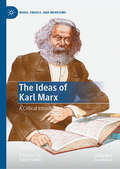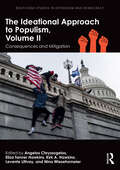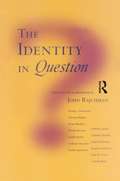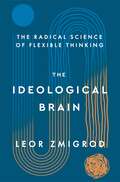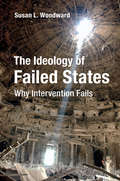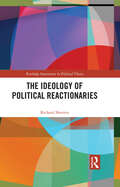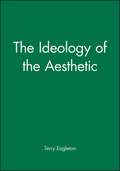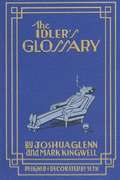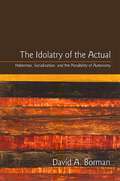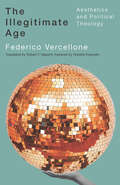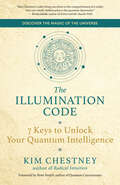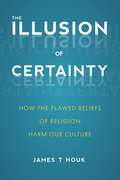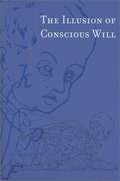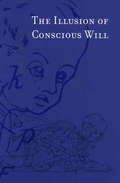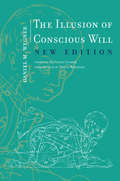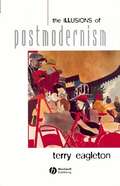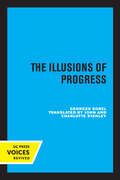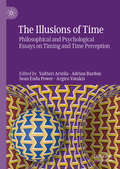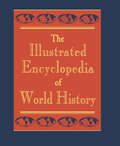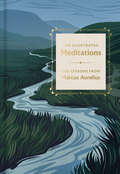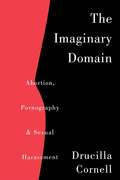- Table View
- List View
The Ideas of Karl Marx: A Critical Introduction (Marx, Engels, and Marxisms)
by Stefano PetruccianiThis book offers a complete presentation of the most important themes of Marx’s thought, following the development of Marx’s theory from the beginning to his death and offering a reconstruction and analysis that covers the whole of Marx’s life and works. Each chapter presents one of the central topics of Marx’s reflection: the confrontation with the Hegelian theory of the State (1843); the critique of political liberalism in the “On the Jewish Question”; the discovery of Political Economy in the Manuscripts of 1844; the new theory of history developed in The German Ideology; the political theory and the revolution of 1848; the critique of political economy from the Grundrisse to Capital; and the political thought of the last Marx (the Paris Commune and the critique of the German Social Democratic Party).Stefano Petrucciani is Professor of Political Philosophy at the University of Rome La Sapienza, Italy.
The Ideational Approach to Populism, Volume II: Consequences and Mitigation (ISSN)
by Kirk A. Hawkins Levente Littvay Angelos Chryssogelos Eliza Tanner Hawkins Nina WiesehomeierThis book provides a series of specific predictions about the distinct impact of populist ideas.In this sequel to the first volume, the ideational approach to populism is extended, providing a robust theoretical framework for understanding populism’s consequences and for identifying policies that mitigate its most negative effects. It reaffirms that ideas matter, arguing that an ideational definition of populism leads to more accurate, and sometimes surprising predictions about the impact of populism at multiple levels of analysis. The chapters of this edited volume explore the effect of populist ideas in each of four areas: consequences for state-level institutions, voters, and international relations; and mitigation. The ideational approach encourages us instead to invest in more systematic engagement with populists and pay better attention to our communication skills.It will be of interest to students and scholars of politics, international relations, social psychology, and political communication.
The Identity in Question
by John RajchmanFirst published in 1996. Routledge is an imprint of Taylor & Francis, an informa company.
The Ideological Brain: The Radical Science of Flexible Thinking
by Leor ZmigrodNamed a best book of the year by The Guardian and The TelegraphWhy do some people become radicalized? How do ideologies shape the human brain? And how can we unchain our minds from toxic dogmas?In The Ideological Brain, Leor Zmigrod reveals the deep connection between political beliefs and the biology of the brain. Drawing on her own pioneering research, she uncovers the complex interplay between biology and environment that predisposes some individuals to rigid ways of thinking, and explains how ideologies take hold of our brains, fundamentally changing the way we think, act and interact with others. She shows how ideologues of all types struggle to change their thought patterns when faced with new information, culminating in the radical message that our politics are not superficial but are woven into the fabric of our minds.This authoritative, accessible and playful blend of psychology, politics and philosophy explores the cutting-edge of the emerging field of political neuroscience. Zmigrod examines its historical roots before she looks to the future, considering the broader social and political implications of her groundbreaking research. Guiding readers through her experiments, she eventually describes what a free, authentic, and tolerant brain looks like, and explains how anyone can keep their mind open and flexible in the face of extremist ideologies.
The Ideology of Failed States
by Woodward Susan L.What do we mean when we use the term 'failed states'? This book presents the origins of the term, how it shaped the conceptual framework for international development and security in the post-Cold War era, and why. The book also questions how specific international interventions on both aid and security fronts - greatly varied by actor - based on these outsiders' perceptions of state failure create conditions that fit their characterizations of failed states. Susan L. Woodward offers details of international interventions in peacebuilding, statebuilding, development assistance, and armed conflict by all these specific actors. The book analyzes the failure to re-order the international system after 1991 that the conceptual debate in the early 1990s sought - to the serious detriment of the countries labelled failed or fragile and the concept's packaging of the entire 'third world', despite its growing diversity since the mid-1980s, as one.
The Ideology of Political Reactionaries (Routledge Innovations in Political Theory)
by Richard ShortenThe Ideology of Political Reactionaries offers a new perspective on the beliefs reactionaries share, presenting a theory of reactionary ideology in the process. Rather than taking self-contradictions in the reactionary imagination as a reason for diminishment, complexity is taken as a challenge. The book argues that the features that unite reactionaries lie in rhetoric. Reactionaries make three persuasive appeals: to decadence, conspiracy, and indignation. They also display some recurrent styles. The book’s rhetorical approach entails a critique of the alternative approaches to reactionary politics (dubbed as ‘dispositional’, ‘sociological’, and ‘conceptual’). At the heart of the book is the textual analysis of the writings of a range of figures who are chosen in deliberate diversity and who have interacted with political audiences in different eras and settings: Edmund Burke, Joseph de Maistre, Sarah Palin, Donald Trump, Adolf Hitler, Éric Zemmour, Joe McCarthy, Anders Breivik, and Nigel Farage. Analysis of their writings helps the book to reckon with some particular puzzles of ideologies and rhetoric. These puzzles include the proximity of reactionaries to conservatism, the ambiguity of their nostalgia, the myth of their essential charisma, and the apparent fetishization of facts. The Ideology of Political Reactionaries ought to interest anyone concerned about current ideological trends and, in particular, students and scholars of politics and history.
The Ideology of Tyranny
by Guido Giacomo PreparataThe contemporary jargon of political correctness and the so-called "politics of diversity" so prevalent in the academic and administrative discourse of the United States can be traced to the fantastic sociology of an obscure French pornographer, Georges Bataille (1897-1962). The celebration of violence sung in his works, re-elaborated in abstract form by the late followers of Bataille, has led to the creation of a peculiar talk emphasizing difference, antagonism, intellectual despair, and a profound political conservatism. This bookascribes the late state of paralysis affecting dissent in America to the adoption of a peculiar gospel of divisiveness, which was promoted in the Eighties by importing from France the "theories" of philosopher Michel Foucault. "
The Ideology of the Aesthetic
by Terry EagletonThe Ideology of the Aesthetic presents a history and critique of the concept of the aesthetic throughout modern Western thought. As such, this is a critical survey of modern Western philosophy, focusing in particular on the complex relations between aesthetics, ethics and politics. Eagleton provides a brilliant and challenging introduction to these concerns, as characterized in the work of Kant, Schiller, Schopenhauer, Kierkegaard, Marx, Nietzsche, Freud, Heidegger, Lukacs, Adorno, Habermas, and others. Wide in span, as well as morally and politically committed, this is Terry Eagleton's major work to date. It forms both an original enquiry and an exemplary introduction.
The Idler's Glossary
by Seth Joshua Glenn Mark KingwellFor as long as mankind has had to work for a living, people who work have disparaged those who prefer not to. This glossary playfully explores the etymology and history of hundreds of idler-specific terms and phrases, while offering a foundation for a new mode of thinking about work and labor.
The Idolatry of the Actual: Habermas, Socialization, and the Possibility of Autonomy (SUNY series in the Philosophy of the Social Sciences)
by David A. BormanThe first close study of Jürgen Habermas's theory of socialization, a central but infrequently discussed component of his defense of deliberative democracy, The Idolatry of the Actual charts its increasingly uneasy relationship with the later development of Habermas's social theory. In particular, David A. Borman argues that Habermas's account of the development of the subject and of the conditions under which autonomy can be realized is fundamentally at odds with the increasingly liberal tenor of his social theory. This leads Borman to return to the set of concerns that guided Habermas's social theory in the early 1970s, paying particular attention to questions of crisis and the means by which public reactions are shaped—questions perhaps more relevant today than they have been at any time since the 1930s. Using Habermas's early work as a framework, Borman constructs an original critical-theoretical argument that draws on research in the sociology of schooling to understand how attitudes toward work, reward, achievement, class, gender, and race are shaped in economically functional ways, and draws on philosophical and empirical scholarship to demonstrate the challenges of multicultural integration and the impact of both on the potential for progressive social transformation.
The Ignorant Schoolmaster: Five Lessons In Intellectual Emancipation
by Kristin Ross Jacques RancièreThis extraordinary book can be read on several levels. Primarily, it is the story of Joseph Jacotot, an exiled French schoolteacher who discovered in 1818 an unconventional teaching method that spread panic throughout the learned community of Europe. Knowing no Flemish, Jacotot found himself able to teach in French to Flemish students who knew no French; knowledge, Jacotot concluded, was not necessary to teach, nor explication necessary to learn. The results of this unusual experiment in pedagogy led him to announce that all people were equally intelligent. From this postulate, Jacotot devised a philosophy and a method for what he called "intellectual emancipation"--a method that would allow, for instance, illiterate parents to themselves teach their children how to read. The greater part of the book is devoted to a description and analysis of Jacotot's method, its premises, and (perhaps most important) its implications for understanding both the learning process and the emancipation that results when that most subtle of hierarchies, intelligence, is overturned. The book, as Kristin Ross argues in her introduction, has profound implications for the ongoing debate about education and class in France that has raged since the student riots of 1968, and it affords Ranciere an opportunity (albeit indirectly) to attack the influential educational and sociological theories of Pierre Bourdieu (and others) that Ranciere sees as perpetuating inequality.
The Illegitimate Age: Aesthetics and Political Theology (Outspoken)
by Federico VercelloneOur age – saturated with media images and ever-present political crises – traces back to the beginning of Christianity and its messianic vision of the world. In the twentieth and twenty-first centuries, our sense of time and history has become apocalyptic.In The Illegitimate Age Federico Vercellone explains contemporary affinities for both apocalypse and media imagery from the perspective of political theology, drawing from St Paul’s mysterious figure of the katechon – the withholding power that prevents the arrival of the Antichrist and the end of times while also delaying the Messiah, therefore containing the very evil it restrains. Vercellone highlights representation as a crucial aspect of the katechon myth, finding within it the roots of current political and aesthetic forms. In the context of contemporary populism, charismatic leaders build their power on presumed prestige, mimicry of sacred figures, and pandering invocations of kitsch, all recurrent aspects of the katechon and Antichrist trope in Western art and history. Political power, Vercellone argues, has been deeply aestheticized, and the path that led us here was laid long before mass media, mass consumption, and our society of the spectacle.A new interpretation of the political and aesthetic categories first suggested by Carl Schmitt, Walter Benjamin, and Jean Baudrillard, The Illegitimate Age turns a fresh lens on the legitimacy of political power, the appeal of populism, and the role of the image in our society.
The Illumination Code: 7 Keys to Unlock Your Quantum Intelligence
by Kim Chestney“Kim Chestney’s codes bring you closer to the comprehension of a reality that was wholly hidden prior to the quantum discoveries.” — Ervin László, author of Science and the Akashic Field Intuition — the extraordinary ability to access information from the quantum realms — is fast becoming humanity’s most advanced form of knowledge acquisition. The Illumination Code presents seven keys to unlock your inner dimension so you can access expanded states of awareness that exist beyond the limits of the rational mind. Kim Chestney reveals the deeply personal nature of the universe while offering a new way to know the unknowable and experience the seemingly impossible. As you venture inward on this step-by-step journey, you will gain profound insights and discover the true power of your own inner wisdom.
The Illusion of Certainty: How the Flawed Beliefs of Religion Harm Our Culture
by James T. HoukIn this examination of religion's influence on society, an anthropologist critiques fundamentalism and all mindsets based on rigid cultural certainties. The author argues that the future can only be safeguarded by a global humanistic outlook that recognizes and respects differing cultural perspectives and endorses the use of critical reason and empiricism. Houk coins the term "culturalism" to describe dogmatic viewpoints governed by culture-specific values and preconceived notions. Culturalism gives rise not only to fundamentalism in religion but also stereotypes about race, gender, and sexual orientation.Turning specifically to Christian fundamentalism, the author analyzes the many weaknesses of what he calls a faith-based epistemology, particularly as such thinking is displayed in young-earth creationism, the reliance on revelation and subjective experiences as a source of religious knowledge, and the reverence accorded the Bible despite its obvious flaws. As he points out, the problem with such cultural knowledge generally is that it is non-falsifiable and ultimately has no lasting value in contrast to the data-based and falsifiable knowledge produced by science, which continues to prove its worth as a reliable source of accurate information.Concluding that there is no future to the fundamentalist mindset in a diverse world where religion often exacerbates conflicts, he makes a strong case for reason and mutual tolerance.
The Illusion of Conscious Will
by Daniel M. WegnerSelected as a Finalist in the category of Psychology/Mental Health in the 2002 Independent Publisher Book Awards (IPPYs) presented by Independent Publisher Magazine, Silver Award Winner for Philosophy in the 2002 Fore Word Magazine Book of the Year Awards, and Selected as an Outstanding Academic Book for 2002 by Choice Magazine. Do we consciously cause our actions, or do they happen to us? Philosophers, psychologists, neuroscientists, theologians, and lawyers have long debated the existence of free will versus determinism. In this book Daniel Wegner offers a novel understanding of the issue. Like actions, he argues, the feeling of conscious will is created by the mind and brain. Yet if psychological and neural mechanisms are responsible for all human behavior, how could we have conscious will? The feeling of conscious will, Wegner shows, helps us to appreciate and remember our authorship of the things our minds and bodies do. Yes, we feel that we consciously will our actions, Wegner says, but at the same time, our actions happen to us. Although conscious will is an illusion, it serves as a guide to understanding ourselves and to developing a sense of responsibility and morality. Approaching conscious will as a topic of psychological study, Wegner examines the issue from a variety of angles. He looks at illusions of the will--those cases where people feel that they are willing an act that they are not doing or, conversely, are not willing an act that they in fact are doing. He explores conscious will in hypnosis, Ouija board spelling, automatic writing, and facilitated communication, as well as in such phenomena as spirit possession, dissociative identity disorder, and trance channeling. The result is a book that sidesteps endless debates to focus, more fruitfully, on the impact on our lives of the illusion of conscious will.
The Illusion of Conscious Will (The\mit Press Ser.)
by Daniel M. WegnerA novel contribution to the age-old debate about free will versus determinism.Do we consciously cause our actions, or do they happen to us? Philosophers, psychologists, neuroscientists, theologians, and lawyers have long debated the existence of free will versus determinism. In this book Daniel Wegner offers a novel understanding of the issue. Like actions, he argues, the feeling of conscious will is created by the mind and brain. Yet if psychological and neural mechanisms are responsible for all human behavior, how could we have conscious will? The feeling of conscious will, Wegner shows, helps us to appreciate and remember our authorship of the things our minds and bodies do. Yes, we feel that we consciously will our actions, Wegner says, but at the same time, our actions happen to us. Although conscious will is an illusion, it serves as a guide to understanding ourselves and to developing a sense of responsibility and morality.Approaching conscious will as a topic of psychological study, Wegner examines the issue from a variety of angles. He looks at illusions of the will—those cases where people feel that they are willing an act that they are not doing or, conversely, are not willing an act that they in fact are doing. He explores conscious will in hypnosis, Ouija board spelling, automatic writing, and facilitated communication, as well as in such phenomena as spirit possession, dissociative identity disorder, and trance channeling. The result is a book that sidesteps endless debates to focus, more fruitfully, on the impact on our lives of the illusion of conscious will.
The Illusion of Conscious Will, New Edition (The\mit Press Ser.)
by Daniel M. WegnerA new edition of Wegner's classic and controversial work, arguing that conscious will simply reminds of us the authorship of our actions.Do we consciously cause our actions, or do they happen to us? Philosophers, psychologists, neuroscientists, theologians, and lawyers have long debated the existence of free will versus determinism. With the publication of The Illusion of Conscious Will in 2002, Daniel Wegner proposed an innovative and provocative answer: the feeling of conscious will is created by the mind and brain; it helps us to appreciate and remember our authorship of the things our minds and bodies do. Yes, we feel that we consciously will our actions, Wegner says, but at the same time, our actions happen to us. Although conscious will is an illusion (“the most compelling illusion”), it serves as a guide to understanding ourselves and to developing a sense of responsibility and morality. Wegner was unable to undertake a second edition of the book before his death in 2013; this new edition adds a foreword by Wegner's friend, the prominent psychologist Daniel Gilbert, and an introduction by Wegner's colleague Thalia Wheatley.Approaching conscious will as a topic of psychological study, Wegner examines cases both when people feel that they are willing an act that they are not doing and when they are not willing an act that they in fact are doing in such phenomena as hypnosis, Ouija board spelling, and dissociative identity disorder.Wegner's argument was immediately controversial (called “unwarranted impertinence” by one scholar) but also compelling. Engagingly written, with wit and clarity, The Illusion of Conscious Will was, as Daniel Gilbert writes in the foreword to this edition, Wegner's “magnum opus.”
The Illusion of Well-Being: Economic Policymaking Based on Respect and Responsiveness
by Mark D. WhiteThe use of measures of economic output to guide policymaking has been criticized for decades because of their weak ties to human well-being. Recently, many scholars and politicians have called for measures of happiness or subjective well-being to be used to guide policy in people's true interests. In The Illusion of Well-Being, Mark D. White explains why using happiness as a tool for policymaking is misguided and unethical. Happiness is too vague a term to define, and too general a concept, to measure in a way that captures people's true feelings. He extends this critique to well-being in general and concludes that no measure of well-being can do justice to people's true interests, which are complex, multifaceted, and subjective. White suggests instead that policymaking be conducted according to respect and responsiveness, promoting the true interests of citizens while addressing their real needs, and devoting government resources to where they can do the most good.
The Illusions of Postmodernism
by Terry EagletonIn this brilliant critique, Terry Eagleton explores the origins and emergence of postmodernism, revealing its ambivalences and contradictions. Above all he speaks to a particular kind of student, or consumer, of popular "brands" of postmodern thought.
The Illusions of Progress
by Georges SorelThis title is part of UC Press's Voices Revived program, which commemorates University of California Press’s mission to seek out and cultivate the brightest minds and give them voice, reach, and impact. Drawing on a backlist dating to 1893, Voices Revived makes high-quality, peer-reviewed scholarship accessible once again using print-on-demand technology. This title was originally published in 1969.
The Illusions of Time: Philosophical and Psychological Essays on Timing and Time Perception
by Adrian Bardon Valtteri Arstila Sean Enda Power Argiro VatakisThis edited collection presents the latest cutting-edge research in the philosophy and cognitive science of temporal illusions. Illusion and error have long been important points of entry for both philosophical and psychological approaches to understanding the mind. Temporal illusions, specifically, concern a fundamental feature of lived experience, temporality, and its relation to a fundamental feature of the world, time, thus providing invaluable insight into investigations of the mind and its relationship with the world. The existence of temporal illusions crucially challenges the naïve assumption that we can simply infer the temporal nature of the world from experience. This anthology gathers eighteen original papers from current leading researchers in this subject, covering four broad and interdisciplinary topics: illusions of temporal passage, illusions and duration, illusions of temporal order and simultaneity, and the relationship between temporal illusions and the cognitive representation of time.
The Illustrated Encyclopedia of World History
by Donker Van HeelPeter deLeon argues that while it is often individuals who actually engage in political corruption, it is the US political system that condones or encourages such actions. Once this perspective is recognised, one can begin to understand ways in which the costs of corruption might be alleviated.
The Illustrated Meditations: Life Lessons from Marcus Aurelius
by Marcus AureliusStunning artworks bring more than sixty reflections from the iconic Stoic work Meditations by Marcus Aurelius to vivid life."What is not good for the hive is not good for the bee either." —Marcus AureliusRoman Emperor and philosopher Marcus Aurelius wrote the twelve books of Meditations over two thousand years ago as a personal diary of notes, nudges, and mental exercises to help him live a good life. His work has since become one of the greatest works of spiritual reflection ever written—required reading for statespersons and philosophers and inspiration to generations of readers who have responded to the intimacy of his writing. With their gentle instructions on living stoically, in harmony with nature, and in pursuit of the common good, Aurelius's lessons still resonate today, helping us manage the modern malaise.This beautifully designed book features a curated selection from modern philosopher James Romm of the most significant life lessons, arranged in chapters that touch on the mind, living well, nature, community, compassion, time, death, and more. Woodcut-style art adds texture and color to the pages, illustrating the concepts of each lesson in the book. Chapter introductions explain each lesson's history and philosophy, and throughout, modern philosophical commentary expands on each lesson, making this a perfect Stoic starting point and gift for anyone who loves ancient philosophy.
The Illustrated Walden: Thoreau Bicentennial Edition
by Henry David ThoreauTo coincide with the bicentennial of Thoreau's birth and TarcherPerigee's publication of Expect Great Things: The Life of Henry David Thoreau, here is a sumptuous rediscovery edition of the first illustrated volume of Thoreau's classic, as originally issued in 1897.In 1897, thirty-five years after Thoreau's death, Houghton Mifflin issued a two-volume "Holiday Edition" of Walden illustrated with thirty remarkable engravings, daguerreotypes, and period photographs. In 1902 the publisher collected the work into a single volume. Now, to mark the bicentennial of Thoreau's birth in 1817, this timeless landmark is reproduced with all of the original illustrations and the complete text of his mystical, practical, magisterial record of a life in the woods.From the Trade Paperback edition.
The Imaginary Domain: Abortion, Pornography and Sexual Harrassment
by Drucilla CornellFirst published in 1995. Routledge is an imprint of Taylor & Francis, an informa company.
